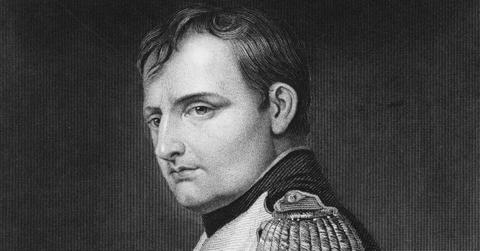Napoleon Bonaparte’s life is endlessly fascinating, but his death is also a topic of discussion. Here’s what we know about his cause of death.

The entertainment world has gotten a lot of mileage out of Napoleon Bonaparte, France’s emperor from 1804 to 1814. ABBA’s song Waterloo is about the battle of the same name, where Napoleon famously surrendered and ended the Napoleonic Wars. He showed up in Bill & Ted’s Excellent Adventure where he discovered a fondness for ice cream and waterslides. In November 2023, Joaquin Phoenix will don his well-known hat in Ridley Scott’s Napoleon. We just can’t get enough.
Article continues below advertisement
Napoleon’s life story is certainly worth telling in multiple mediums, but what’s also interesting about the slight ruler is his death. Controversy and conspiracies still swirl around the last days of the former emperor’s life. Here’s what we know about Napoleon’s cause of death.

Article continues below advertisement
What was Napoleon’s cause of death? It was messy.
According to PBS, the war-obsessed military leader died at the age of 51 on May 5, 1821, on the island of St. Helena, where he had been living in exile for six years. By the time of his death, Napoleon “had been getting sicker for several months, suffering from recurrent abdominal pain, progressive weakness, and unabating constipation.”
His final weeks were marked by “vomiting, incessant hiccups, and blood clots, or thrombophlebitis, in various parts of his body.” It wasn’t until Napoleon’s autopsy was performed the day after his passing, that doctors were able to get any information. Medical practitioners came to the conclusion that his “death was from stomach cancer, exacerbated by bleeding gastric ulcers, after a huge dose of calomel — a compound containing mercury that was used as a medicine — was administered to him on the day before he died.”
Article continues below advertisement
There is at least one nefarious theory regarding Napoleon’s passing.
In an October 1961 article from Nature Magazine, Swedish dentist Sten Forshufvud along with Dr. Hamilton Smith of Glasgow and Dr. Anders Wassen of Sweden tested a strand of Napoleon’s hair. They obtained this courtesy of “M. le Commandant Henry Lachouque, the great French expert on Napoleon’s life and the organizer of the permanent Napoleonic exhibitions on St. Helena.”
Article continues below advertisement
They sent Napoleon’s hair to the Department of Forensic Medicine at the University of Glasgow where it was tested using methods available at the time. They found large amounts of arsenic and came to the conclusion that the emperor died from arsenic poisoning. After analyzing a second strand of hair in May 1962, the team published a follow up paper in Nature Magazine in May 1962. They theorized that he had been poisoned over the course of several months and not all at once.
Nearly 50 years later in December 2008, chemists J. Thomas Hindmarch and John Savory refuted this claim stating, “Arsenic was ubiquitous in the 19th century.” It was found in “rodenticide, insecticide, and preservative and in face and hair powders (Napoleon used hair powder), clothing dyes, and even candy wrappers, as well as being extensively prescribed as a tonic (Fowler’s Solution).”
Article continues below advertisement

Historians and history fanatics alike have latched onto the arsenic poison idea and even have a suspect in mind. Some believe the man behind the possible murder was “Charles Tristan, marquis de Montholon, who was Napoleon’s boon companion when they were both on the island of St. Helena.”
What might his motive have been? It’s one of the classics: money. Word on the street is, Napoleon left Montholon 2 million francs in his will and they certainly couldn’t get to that while he was alive. As saucy as this is, it’s important to note that Napoleon’s family had a history of gastric carcinomas. As Napoleon himself once said, “An army marches on its stomach,” and it appears an army marched on his.
Source: https://www.distractify.com/p/napoleon-cause-of-death
